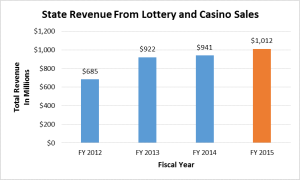Casinos Contributed Millions More To Education, Resulting In the State Spending Less
Despite almost $60 million in additional revenue specifically for education spending due to record high casino profits, thousands of Maryland public school teachers and staff face possible termination.
That’s because surplus funds are not going toward increasing the state’s education spending levels of the year prior, but instead being used to replace education funds that were spent on other things.
The state took in a record $1 billion in revenue from Maryland’s lottery and casino gambling activity during the last fiscal year. This total was comprised of $525 million from the lottery and $487 million from the state’s five casinos, representing a 19.1 percent increase from the previous year and a 47.7 percent increase from June 2012 (when there were three fewer casinos), according to figures from the Maryland Lottery and Gaming Control Agency.
This dramatic increase in revenue resulted in a contribution of $387.7 million to the Maryland Education Trust Fund. Last year’s increase in casino revenue is in large part due to the opening of Baltimore’s Horseshoe Casino. Next year, Maryland plans to open its sixth casino, in Prince George’s County, which will certainly raise the expectation of state revenue growth for the next several years. However, state policymakers should remain cognizant of the fact that this is not a limitless source of revenue for the state and it will eventually stabilize once the regional gambling market reaches its capacity.
To win approval for casino gambling, Maryland policymakers promised voters that funding for schools would increase as a direct result. Instead, while support for education from gaming has grown, other sources of education funding decreased or were transferred to other purposes.
If gaming revenues had gone to increasing instead of replacing education funding, Maryland schools would have had millions more in support. The governor and lawmakers should reverse this course and find ways to restore the diverted funds to education, using these additional resources to invest in the future of our state—our children.

